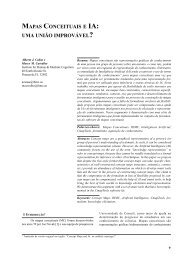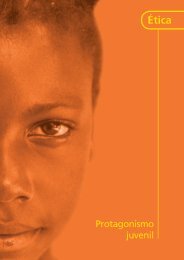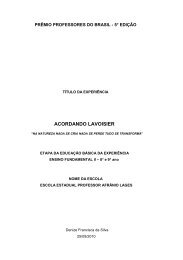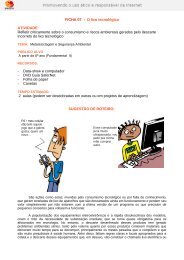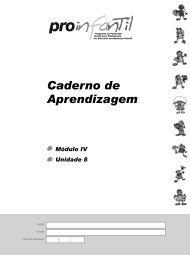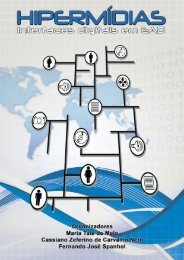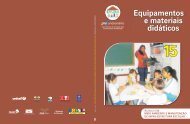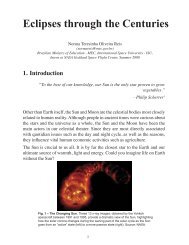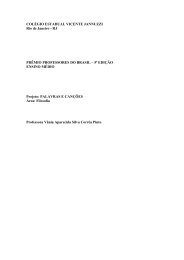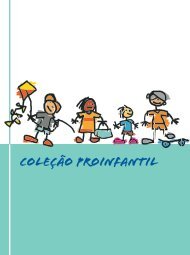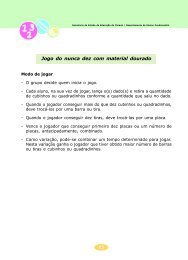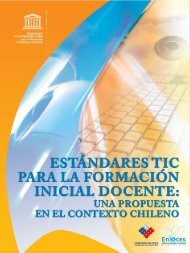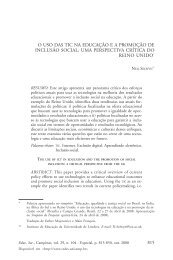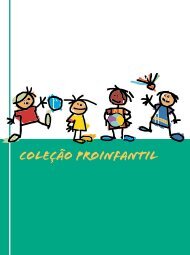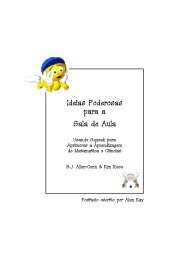BIO-CULTURAL COMMUNITY PROTOCOLS - Portal do Professor
BIO-CULTURAL COMMUNITY PROTOCOLS - Portal do Professor
BIO-CULTURAL COMMUNITY PROTOCOLS - Portal do Professor
Create successful ePaper yourself
Turn your PDF publications into a flip-book with our unique Google optimized e-Paper software.
PART I / CHAPTER 1<br />
• We hold precious all life in its natural form. The harmonious<br />
progress of the natural order in the environment shapes<br />
and defines healthy genetic diversity.<br />
• We oppose the patenting of all natural genetic materials.<br />
We hold that life cannot be bought, owned, sold, discovered<br />
or patented, even in its smallest form.<br />
• We denounce and identify the instruments of intellectual<br />
property rights, patent law, and apparatus of informed<br />
consent as tools of legalized western deception and theft.<br />
These declarations constitute a statement of values that<br />
counter the legal subject with what can be called the “biospiritual<br />
self”. The bio-spiritual self is an expression of a<br />
“connective imagination,” 6<br />
which is a way of being in the<br />
world that sees the self as embedded within a network of<br />
relationships with land, water, plants, and animals, expressed<br />
through culture and integrated into customary laws. 7<br />
The results of this intimate relationship can be understood<br />
as forming a landscape in which humans have had to adapt<br />
to the land, and in <strong>do</strong>ing so have also adapted the land. They<br />
emphasize that the bio-cultural foundations of their<br />
traditional knowledge cannot be seen as separate from<br />
the land and animals, their culture, and spiritual beliefs,<br />
4. TK as a Commodity and its Impact on ILCs<br />
The reduction of Article 8(j) in the current negotiations of<br />
the WGABS to a provision that grants intellectual property<br />
rights to ILCs over their TK and affirms their right to trade it<br />
in exchange for benefits is a result of conflating the legal<br />
subject under Article 15 with the bio-cultural self that<br />
Article 8(j) seeks to affirm.<br />
The State as the legal subject under Article 15 is typical of the<br />
legal subject within contemporary jurisprudence as a selfenclosed<br />
bearer of proprietary rights over GR that it can use<br />
and transfer to others. Article 8(j), on the other hand, juxtaposes<br />
this legal subject with the bio-spiritual self that emerges from<br />
a bio-cultural way of life. As illustrated above, the bio-spiritual<br />
6 . Kakar, Sudhir, Mad and Divine: Spirit and Psyche in the Modern World, Penguin India: New Delhi, 2008, p.154.<br />
7 . This issue is further discussed in Chapter 7 that addresses Bio-cultural Jurisprudence.<br />
A <strong>BIO</strong>-<strong>CULTURAL</strong> CRITIQUE OF THE CBD AND ABS<br />
or outside the framework of their customary laws - in other<br />
words, each community’s endemic way of life. Specifically,<br />
the knowledge, innovations and practices of ILCs have<br />
developed out of their interactions with nature and are<br />
indispensable to their ways of life. In Chapter 2, a number of<br />
communities speak to this issue, highlighting how important<br />
their TK is to their everyday lives, such as healing community<br />
members and animals, knowing where to find pasture in dry<br />
lands and using sustainable harvesting techniques among<br />
other means to support their ways of life. Thus TK is not an<br />
end product of a traditional lifestyle, but critical to<br />
communities’ day-to-day lives.<br />
Such a way of life is based on spiritual foundations and cultural<br />
practices that understand the self very differently from the<br />
legal subject that underlies the property rights discourse.<br />
The challenge then for the potential IRABS is to ensure that<br />
the effective implementation of the in situ conservation<br />
objective of Article 8(j) extends beyond acknowledging<br />
intellectual property rights of ILCs over their TK and towards<br />
affirming, safeguarding and promoting the foundations of<br />
their bio-cultural ways of life, such as access to and<br />
management of their natural resources, to which TK is integral.<br />
self is rooted in an ethical framework that is oriented less<br />
towards affirming the proprietary rights of the subject over<br />
the ecosystem than towards upholding a bio-cultural<br />
relationship between the bio-spiritual self and nature.<br />
Interpreting Article 8(j) as a provision that is restricted only to<br />
affirming the intellectual property rights of ILCs over their TK<br />
and not as a right to a bio-cultural way of life has had the<br />
adverse consequence of forcing ILCs to organize themselves<br />
along the lines of a legal subject, where the community<br />
identity is incorporated like any other corporation and their<br />
culture is commodified as a tradable good.<br />
16



